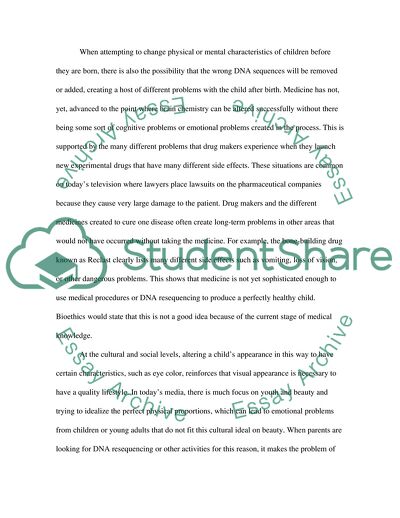
- Home
- Free Samples
- Premium Essays
- Editing Services
- Extra Tools
- Essay Writing Help
- About Us
- Studentshare
- Subjects
- Miscellaneous
- Bioethics
Bioethics - Essay Example

- Subject: Miscellaneous
- Type: Essay
- Level: Ph.D.
- Pages: 4 (1000 words)
- Downloads: 0
- Author: deloresschuster
Extract of sample "Bioethics"
This paper identifies whether changing children and their biological traits is a good practice. Being able to use genetics to change certain personality or physical traits of children, this is not generally a good idea. Most of these procedures involve making changes to the child’s DNA, either before conception or afterward, which can lead to a variety of genetic problems that would not have occurred without these medical procedures. For example, a child could be born without their limbs, especially if the research was conducted in a third world country where genetic research is only in its infancy.
Therefore, in terms of protecting the interests of the unborn child, those who argue that this is unethical actually have much solid evidence to support their position. When attempting to change physical or mental characteristics of children before they are born, there is also the possibility that the wrong DNA sequences will be removed or added, creating a host of different problems with the child after birth. Medicine has not, yet, advanced to the point where brain chemistry can be altered successfully without there being some sort of cognitive problems or emotional problems created in the process.
This is supported by the many different problems that drug makers experience when they launch new experimental drugs that have many different side effects. These situations are common on today’s television where lawyers place lawsuits on the pharmaceutical companies because they cause very large damage to the patient. Drug makers and the different medicines created to cure one disease often create long-term problems in other areas that would not have occurred without taking the medicine. For example, the bone-building drug known as Reclast clearly lists many different side effects such as vomiting, loss of vision, or other dangerous problems.
This shows that medicine
...Download file to see next pages Read MoreCHECK THESE SAMPLES OF Bioethics
Bioethics Assignment
Bioethics and Longevity
Law and Bioethics
Bioethics book report
The Field of Bioethics
Issues in Bioethics
Ethics: Bioethics
Applying Principles of Bioethics

- TERMS & CONDITIONS
- PRIVACY POLICY
- COOKIES POLICY